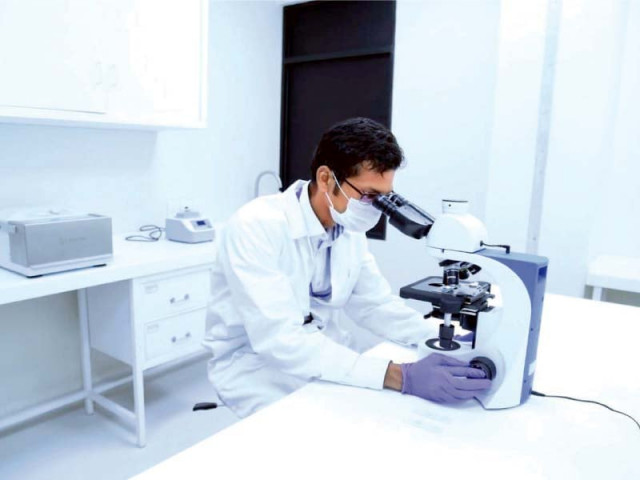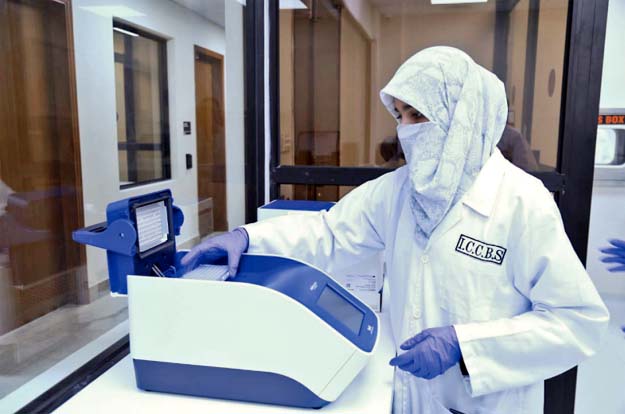Much-needed facility: At long last, Sindh gets own forensic lab
All preparatory work has been completed and all that remains for the provincial government is to inaugurate it

Karachi University’s International Centre for Chemical and Biological Sciences (ICCBS), with the provincial government’s assistance, has established Sindh’s first-ever forensic, DNA and serology analysis laboratory. PHOTOS: EXPRESS
When it came to forensic investigations, criminal investigation teams across Pakistan have had to rely on the Punjab Forensic Science Agency’s (PFSA) facilities. Sindh’s law enforcers, however, may now be able to free themselves from reliance on PFSA as Karachi University’s International Centre for Chemical and Biological Sciences (ICCBS), with the provincial government’s assistance, has established the Sindh’s first-ever forensic, DNA and serology analysis lab.
Tall promises : Sindh to get ‘world-class forensic laboratory’
Although the Sindh government has yet to inaugurate the lab and start a human DNA test on specimen samples, ICCBS has formally informed the provincial health department about the facility’s preparation and completion.
“The new lab has been set up in line with the international standards, and for the purpose, the DNAs of the entire technical staff and scientists have been preserved to avoid any possible errors,” ICCBS Director Dr Iqbal Chaudhry told The Express Tribune.

Scientific equipment for the lab which includes two DNA genetic analysers and two polymerase chain reaction machines (PCR machines) that are widely used in molecular biology to make many copies of a specific DNA segment, has been imported from the United States. The total cost of the two machines is about Rs60 million.
The Sindh government had earmarked Rs260 million for the forensic lab, out of which Rs220 million had been released in January this year. Out of the total budget, Rs150 million will be spent on the procurement of equipment while the remaining amount will be used to pay staff and meet general expenses. The project will be completed within three years.
The Sindh government has yet to issue the remaining grant of Rs40 million which, owing to the depreciation of the rupee, will be inadequate for the three-year project. Sources also revealed that research officers, associate research officers and assistant research officers have been appointed for carrying out DNA-related experiments, who will work under the supervision of forensic scientists.
The Express Tribune was allowed to visit the state-of-the-art lab which is based on various smaller labs. Interestingly, taking international rules into consideration, parallel labs have also been set up in each section.
The forensic lab will serve many purposes, especially in aiding criminal investigation as several biological samples collected from a crime scene will be analysed there to expedite cases.
The project director of the lab Dr Ishtiaq Ahmed explained that the samples sent by the police from a crime scene will be used as evidence during investigations.
Explaining the process of DNA testing, he said that the temperature of the ‘evidence room’ is maintained at 26 C, after which it is transferred into two cold rooms.
“The temperature of one of the rooms is maintained at 4 C, while the temperature of the other room is kept at -20 C,” Dr Ishtiaq explained. “The body parts obtained from a crime scene will be kept in a cold room for screening, which will be a one-of-a-kind facility in the province.”
Dr Ishtiaq further added that other than biological samples, clothes and different items belonging to a person can also be treated as evidence in police investigations.
The evidence will be kept under alternative light sources in the labs, after which they will also undergo additional screening in the next phase which takes place in a dark room. After that, the samples will be sent to the DNA evidence abstraction lab. Parallel to the lab, a reference abstraction DNA lab has also been set up.
That apart, a pre-PCR lab has also been set up where samples will be sent to the PCR machines to analyse the quantity of the DNA. This step is performed to determine how much DNA is obtained from a given sample. After that, the sample will finally be sent to a post-PCR lab where a DNA profile will be obtained through a genetics analyser.
Investigating epidemics: K-P to create network of diagnostic labs
Providing further information about the lab, Dr Iqbal Chaudhry said that the facility is equipped with the means to carry out DNA profiling of nearly 60 samples simultaneously. A DNA test could be conducted on the samples of any human body part recovered from a crime scene, which can include human tissues, hair, skin, nails, and blood, among others.
According to Dr Chaudhry, his institution has set up the DNA laboratory a month before reaching an agreement with the Sindh government, adding that the government is likely to inaugurate the project next month.
Published in The Express Tribune, August 3rd, 2019.



















COMMENTS
Comments are moderated and generally will be posted if they are on-topic and not abusive.
For more information, please see our Comments FAQ